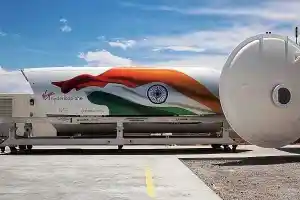India is preparing to build its first operational hyperloop system, starting with a high-speed freight corridor connecting Jawaharlal Nehru Port Trust (JNPT) in Navi Mumbai with the upcoming Vadhavan Port in Maharashtra’s Palghar district. The state government has signed an MoU with TuTr Hyperloop, a deep-tech startup incubated at IIT Madras, to develop a Linear Induction Motor (LIM)-based hyperloop system for the project.
Hyperloop technology enables ultra-fast transportation of passengers and cargo through low-pressure tubes using magnetic levitation, reaching speeds up to 700 miles per hour (1126 km/h). The vacuum environment eliminates air drag, allowing frictionless, high-speed travel — a potential game-changer in logistics and mobility.

The JNPT–Vadhavan hyperloop project aims to resolve persistent cargo movement bottlenecks between India’s busiest ports. JNPT currently handles over half of the country’s container traffic, while Vadhavan is expected to manage 250 million tonnes annually once completed. The hyperloop system promises faster transit, reduced road and rail congestion, and improved port efficiency.
This initiative is part of 10 investment agreements signed by the Maharashtra government, collectively worth ₹428.92 billion ($4.9 billion), projected to create nearly 26,000 jobs.
IIT Madras has already developed a 422-metre operational hyperloop test track and is spearheading national R&D efforts. The project has support from the Union Ministry of Railways, which is exploring a 40–50 km pre-commercial prototype corridor as a next step.
Railway Minister Ashwini Vaishnaw indicated that the government is evaluating further funding opportunities and future integration with Indian Railways’ logistics network.
Maharashtra Deputy Chief Minister Devendra Fadnavis stated, “Hyperloop is not just a transport system—it’s a disruptive force that will redefine logistics, mobility, and economic geography.”
With support from IIT Madras and IIT Bombay, this effort positions Maharashtra—and India—as a global leader in next-generation transportation technology.
